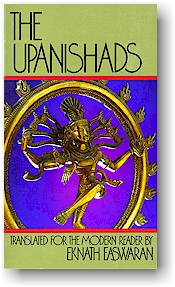| To Netnews Homepage Index |
|
 Eknath Easwaran Eknath EaswaranThe Upanishads 320 pages "What is that by
knowing which all things are known?" With such questions begin the Upanishads, the wellspring of India's loftiest philosophies and faith. Some thousand years old, they do not explain or develop a line of argument in the modern sense. They are darshana, "something seen", and the reader is expected not only to listen to the words but to realize them: that is, to make their truths an integral part of character, conduct, and consciousness. For the last thousand years, ten Upanishads offered in this book in modern English have been considered as "principal Upanishads" on the authority of Shankara, an eighth-century mystic who reawakened India to its spiritual heritage. Included in the book is the Shvetashvatara Upanishad for its great beauty and four Yoga Upanishads to represent later traditions. Easwaran's introduction to this volume covers the background of the Upanishads, their key ideas, and their practical relevance to us today. In so doing he provides an overview of the central ideas of Hinduism and Indian Philosophy. Short introductions to each Upanishad, notes, and a concluding essay have been provided by Michael N. Nagler, Professor of Classics and Comparative Literature at the University of California, Berkeley. From the table of Contents:
Eknath Easwaran was a writer, lecurer and professor of English literature and came to the United States in 1959 on the Fulbright exchange program. He moved to Berkeley, California in 1960, where he founded the Blue Mountain Center of Meditation. Last Updated Thursday, December 31, 1998 |
|
| To Netnews Homepage Index |